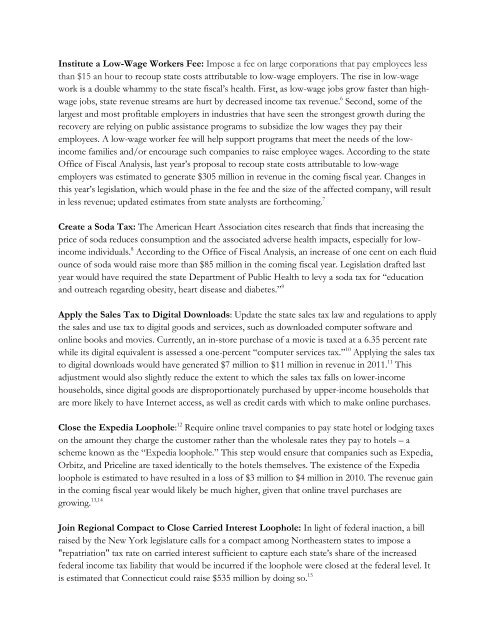Create successful ePaper yourself
Turn your PDF publications into a flip-book with our unique Google optimized e-Paper software.
Institute a Low-Wage Workers Fee: Impose a fee on large corporations that pay employees less<br />
than $15 an hour to recoup state costs attributable to low-wage employers. The rise in low-wage<br />
work is a double whammy to the state fiscal’s health. First, as low-wage jobs grow faster than highwage<br />
jobs, state revenue streams are hurt by decreased income tax revenue. 6 Second, some of the<br />
largest and most profitable employers in industries that have seen the strongest growth during the<br />
recovery are relying on public assistance programs to subsidize the low wages they pay their<br />
employees. A low-wage worker fee will help support programs that meet the needs of the lowincome<br />
families and/or encourage such companies to raise employee wages. According to the state<br />
Office of Fiscal Analysis, last year’s proposal to recoup state costs attributable to low-wage<br />
employers was estimated to generate $305 million in revenue in the coming fiscal year. Changes in<br />
this year’s legislation, which would phase in the fee and the size of the affected company, will result<br />
in less revenue; updated estimates from state analysts are forthcoming. 7<br />
Create a Soda Tax: The American Heart Association cites research that finds that increasing the<br />
price of soda reduces consumption and the associated adverse health impacts, especially for lowincome<br />
individuals. 8 According to the Office of Fiscal Analysis, an increase of one cent on each fluid<br />
ounce of soda would raise more than $85 million in the coming fiscal year. Legislation drafted last<br />
year would have required the state Department of Public Health to levy a soda tax for “education<br />
and outreach regarding obesity, heart disease and diabetes.” 9<br />
Apply the Sales Tax to Digital Downloads: Update the state sales tax law and regulations to apply<br />
the sales and use tax to digital goods and services, such as downloaded computer software and<br />
online books and movies. Currently, an in-store purchase of a movie is taxed at a 6.35 percent rate<br />
while its digital equivalent is assessed a one-percent “computer services tax.” 10 Applying the sales tax<br />
to digital downloads would have generated $7 million to $11 million in revenue in 2011. 11 This<br />
adjustment would also slightly reduce the extent to which the sales tax falls on lower-income<br />
households, since digital goods are disproportionately purchased by upper-income households that<br />
are more likely to have Internet access, as well as credit cards with which to make online purchases.<br />
Close the Expedia Loophole: 12 Require online travel companies to pay state hotel or lodging taxes<br />
on the amount they charge the customer rather than the wholesale rates they pay to hotels – a<br />
scheme known as the “Expedia loophole.” This step would ensure that companies such as Expedia,<br />
Orbitz, and Priceline are taxed identically to the hotels themselves. The existence of the Expedia<br />
loophole is estimated to have resulted in a loss of $3 million to $4 million in 2010. The revenue gain<br />
in the coming fiscal year would likely be much higher, given that online travel purchases are<br />
growing. 13,14<br />
Join Regional Compact to Close Carried Interest Loophole: In light of federal inaction, a bill<br />
raised by the New York legislature calls for a compact among Northeastern states to impose a<br />
"repatriation" tax rate on carried interest sufficient to capture each state’s share of the increased<br />
federal income tax liability that would be incurred if the loophole were closed at the federal level. It<br />
is estimated that Connecticut could raise $535 million by doing so. 15<br />
Connecticut Voices for Children 3


